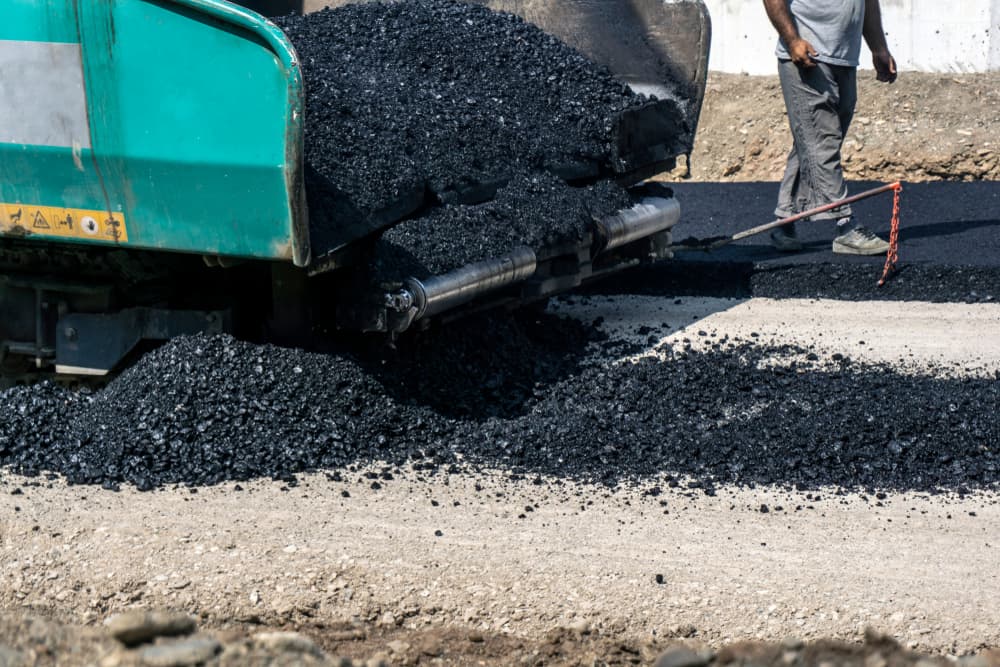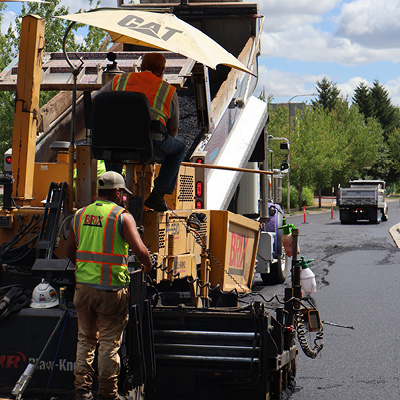Comprehensive Paving Service Tailored to Your Needs
Comprehensive Paving Service Tailored to Your Needs
Blog Article
An Overview of the Types of Asphalt Paving Available Via Specialist Paving Solutions
In the realm of building and facilities, comprehending the different types of asphalt paving is necessary for making notified decisions. Professional paving services provide a series of alternatives, consisting of Warm Mix Asphalt, understood for its resilience, and environment-friendly options like Warm Mix Asphalt. Additionally, remedies such as Cold Mix Asphalt and Permeable Asphalt accommodate certain needs, while Recycled Asphalt Sidewalk emphasizes sustainability. Each type supplies distinctive advantages, however the selection ultimately relies on project demands and problems. Taking a look at these alternatives reveals even more concerning their particular applications and benefits, prompting more exploration right into their viability for your approaching tasks.
Hot Mix Asphalt
What makes warm mix asphalt a recommended choice for lots of paving tasks? Warm mix asphalt (HMA) is renowned for its sturdiness, convenience, and cost-effectiveness, making it a perfect choice for a vast array of applications, from highways to domestic driveways.
(continue reading)The high-temperature application of HMA not only helps with better bonding however likewise boosts the product's load-bearing capability, enabling it to hold up against the stresses enforced by vehicular traffic. Its fast healing time minimizes interruption throughout building and construction, allowing streets to reopen faster.
Environmental factors to consider are also addressed with HMA, as it can be recycled and reused in various tasks, adding to sustainable techniques in paving. Additionally, breakthroughs in modern technology have actually enhanced its performance features, making sure longevity and minimized upkeep demands. These features solidify warm mix asphalt as the gold criterion in the paving sector, supplying a reliable solution for both sturdy and light-duty surface areas.
Warm Mix Asphalt
Warm mix asphalt (WMA) is increasingly used in paving projects because of its ability to be produced and laid at lower temperatures compared to standard hot mix asphalt. This modern technology permits the production of asphalt at temperatures varying from 100 ° F to 250 ° F lower than conventional methods, which dramatically lowers energy consumption and greenhouse gas exhausts throughout production.

One of the key advantages of WMA is its extensive workability duration, which enables service providers to deal with the material for a longer duration prior to it sets. This particular is especially advantageous in cooler climate condition, where typical hot mix asphalt might cool also rapidly to be laid properly. WMA can be easily blended with recycled materials, improving sustainability initiatives within the asphalt paving industry.
Furthermore, the reduced temperature application of WMA lessens the threat of thermal segregation, causing a more consistent and durable sidewalk surface area. Because of this, WMA not only adds to boosted performance attributes yet also decreases the general environmental influence of asphalt paving tasks. This combination of benefits makes cozy mix asphalt a significantly popular choice among leading specialists and customers alike.
Cold Mix Asphalt
Cold mix asphalt is a versatile paving option that is specifically reliable for patching and fixing surfaces in various weather conditions. Unlike hot mix asphalt, which needs home heating, cool mix asphalt can be used straight from its container, making it a perfect choice for quick repair services and upkeep jobs. This a fantastic read kind of asphalt is made up of a combination of accumulation and emulsified asphalt, allowing it to remain workable at lower temperatures.
(check it out)Among the most significant advantages of chilly mix asphalt is its simplicity of application. It can be made use of in both household and commercial projects, offering a functional choice for taking care of holes, fractures, and other surface imperfections. Additionally, cold mix asphalt is appropriate for use in wet conditions, enabling repairs to be made even during inclement weather.
While it is typically not used for hefty website traffic surface areas because of its lower strength compared to warm mix asphalt, cool mix is a superb option for momentary options or locations with lighter web traffic. Its flexibility and adaptability make it a valuable alternative for keeping asphalt surface areas, making sure longevity and performance also under difficult conditions.
Absorptive Asphalt
Absorptive asphalt provides an innovative remedy for handling stormwater runoff, resolving an essential environmental concern usually connected with conventional asphalt paving. This kind of asphalt is developed with a porous framework, allowing rain to infiltrate with the surface and right into a sub-base, where it can be gradually soaked up into the ground or taken care of in a controlled fashion.
The benefits of absorptive asphalt extend beyond water monitoring; they additionally add to minimizing city warm island results and enhancing groundwater recharge - paving. By minimizing surface area drainage, absorptive asphalt helps lower the danger of flooding and erosion, which can be especially advantageous in city areas susceptible to hefty rainfall
Setup of absorptive asphalt requires cautious factor to consider of site conditions and correct design to make sure optimum performance. It is important to develop a well-drained sub-base and to maintain the permeability via normal cleaning to avoid obstructing from particles and sediment.
Recycled Asphalt Pavement
Recycled asphalt pavement (RAP) is an increasingly popular choice in the paving industry, offering both financial and ecological benefits. By recycling asphalt millings from old roads, RAP minimizes the requirement for new materials, thus lowering costs and minimizing the ecological influence connected with asphalt manufacturing.
The process of creating RAP involves crushing existing asphalt surface areas and processing the material to get rid of impurities. This recovered material is then incorporated with brand-new asphalt binder and aggregates to create a top quality paving mix. Utilizing RAP can dramatically lower the amount of waste sent to land fills, adding to a more lasting technique to road construction.
RAP is specifically useful for projects where spending plan restrictions are an issue, as it can reduce material expenses by approximately 30%. Furthermore, the performance of RAP is comparable to that of virgin asphalt, offering toughness and longevity. It appropriates for different applications, consisting of domestic driveways, commercial car park, and roadway resurfacing.
As communities and professionals significantly prioritize lasting techniques, recycled asphalt sidewalk sticks out as a viable option that meets both economic needs and environmental duties, making it a compelling alternative for contemporary paving tasks.

Verdict
In summary, professional paving solutions offer a diverse series of asphalt paving alternatives tailored to particular building and construction requirements. Each type, consisting of Warm Mix Asphalt, Cozy Mix Asphalt, Cold Mix Asphalt, Permeable Asphalt, and Recycled Asphalt Pavement, presents special benefits that deal with both residential and industrial requirements - paving service. The option of the appropriate asphalt type not only improves longevity and efficiency but also addresses ecological problems and sustainability, ensuring efficient and effective paving services
Report this page